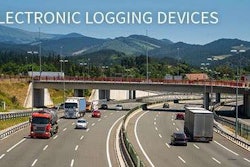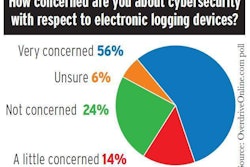OK, first of all, I want y’all to know I’m OK. My head didn’t actually explode when I read this article. I just had a slow trickle of rage-blood seeping through every cell in my body, and I thought my head exploded. It’s all good, I’ve figured out my head isn’t what’s been brutalized in this sweet little deal between the ATA and the gubmint, it’s my posterior unit, and yours too.
So this is where we’re at.
 “This here’s a stick-up. Put all your money into magic clocks and making those magic clocks safe, or you can’t earn money.”
“This here’s a stick-up. Put all your money into magic clocks and making those magic clocks safe, or you can’t earn money.”The ATA pushed hard for the mandate for electronic logs. They said all this stuff about how “safe” it’s going to be. I imagine the conversation might have gone something like this:
ATA: “Hey gubmint, we have a magic clock we want you to make everyone have. It makes us safe.”
Gubmint: “How safe does it make us?”
ATA: “About $88,500 safe, donated to friendly campaigns safe!”
Gubmint: “That’s pretty safe. Sold.”
Of course, there were folks who questioned the validity of their claims of safety. I may know one or two of them. And when they questioned the cybersecurity of the magic clock, the ATA came out and acted like people questioning were some kind of troglodyte, pointing at the sun and grunting. Silly truckers, leave the technology up to the professionals, these things are safe as baby shampoo. (In the interest of validity, I have to note that these may or may not be direct quotes. “May not” is safest to go with, in the interest of satire.)
Fast-forward a few years and more than one battle in court and the magic clocks are finally set to become law, and guess what?
The ATA comes out and says, “Hey, remember all that security we were talking about? Yeah, well about that. Turns out, these things aren’t as cybersecure as we thought they might be, so we’ve developed a Cybersecurity Threat Reporting Service to keep them safe, so the magic clock can keep us all safe.”
And the gubmint is like, “Awesome, just keep plugging those campaign donations in to our ‘friendlies,’ and we’ll forget about the fact that we should probably have one of those in place, too. Good doin’ business with ya.”
Honestly, my blood pressure is ticking up just writing this. It’s not only diabolical, it’s openly savage. It’s the kind of thing comic book villains do.
And because it seems so ridiculous, I had to make sure it was true.
So I jumped on the FMCSA website and opened a chat box. And Jennifer from the FMCSA was right there, almost instantly, to tell me she couldn’t answer my question about what kind of cybersecurity would be offered through the FMCSA that might be comparable to what the ATA is offering for their members. (Which means fee.)
And guess what? Jennifer didn’t have an answer for that, because you know why? There isn’t one. Because the FMCSA is going to put a law in place that requires various types of transmission of sensitive data, but has no set method or alert system for the driver, who is tasked by law to do this, to keep him or herself safe from hacks or outside manipulation. The driver, who is already being forced to put an expensive piece of equipment in their truck that they don’t want, is also going to be tasked with their own cybersecurity – at yet another cost they shouldn’t have to incur.
Now. For those who say, “The units being sold have their own methods of security,” I say this: “So does your laptop, and I’m pretty sure if you’re using it to do business, you’ve paid for further security, and if you haven’t, you should, especially if your banking information is in it. Also, if you really believe there aren’t 14-year-old kids out there who can break most of the devices being sold as ‘secure,’ you’re delusional.”
Technology is made to be broken. That’s why it advances. People who design, code and break these things consider it a personal challenge to break new codes. Not only has the ATA developed a cybersecurity service, they have virtually thrown down the gauntlet to anyone who looks to make their debut as “the next big thing in coding.” When you say something “can’t be broken,” it’s game on to hackers.
I’ve followed money for weeks now. I’ve followed so much money, I’m physically ill that amounts like this are being shoved around. I was never able to put a direct finger on how those really gung-ho for ELD were going to make the fast buck. I figured they’d profit on the slow, gasping death of their competition in the owner-op world, but the minute I read this article it became apparent.
They’re going to profit from (now get ready) making safety-devices-that-make-the-public-safe safe.
If that ain’t some crazy, awful, underhanded crap, it does not exist on this earth.
I find the last line of the article that set me off on this tangent to pretty much sum up the entire sordid affair, and it’s a quote that reads, “It’s all about getting money.”
While the individual quoted was talking about what hackers might gain from penetrating a system, to my mind truer words have never been printed about the ATA’s drive for ELDs itself. This isn’t safety. It’s extortion.









